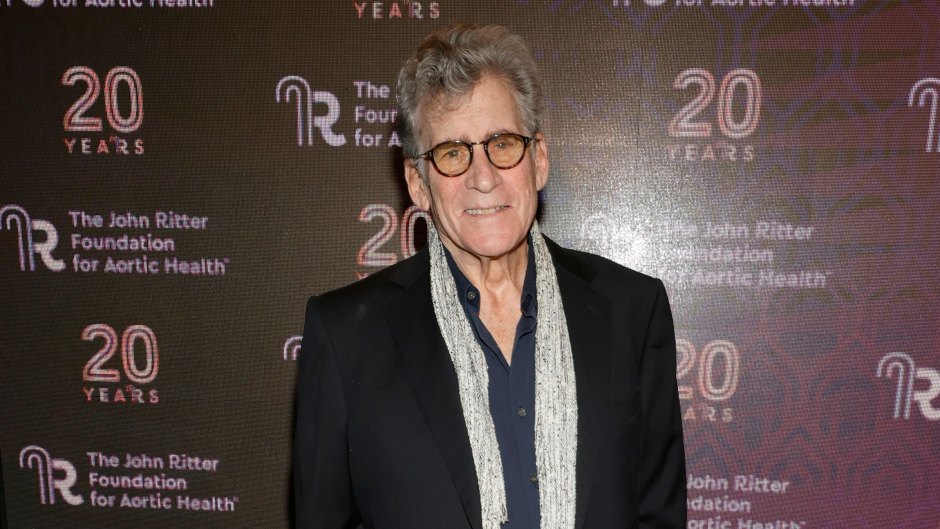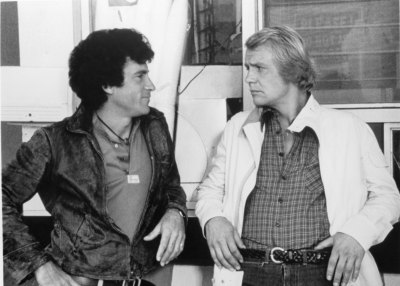
MediaPunch/Shutterstock
Paul Michael Glaser: Live for Today
Paul Michael Glaser admits he didn’t expect anyone to ever see Starsky & Hutch, a TV pilot about two streetwise undercover cops. “I thought, ‘Well, this is never going to make it as a series, and I could use some new film on myself,’” the actor-director tells Closer exclusively. “Then I auditioned for it and got it. And then it became this big hit. It happened pretty fast.” The show ran for four seasons and made Paul a household name.
Since then, he has spent more time behind the camera as a writer and director, although he’s occasionally returned to acting, too. Paul, 80, has also begun a third chapter of his creative life as a digital artist and painter. “The one thing that ties it all together — the acting, directing, writing, painting — it’s storytelling,” he says. “I love doing a painting that is evocative, that raises a question that can become a conversation piece and registers emotionally with the viewer.” Paul also remains an honorary board member of the Elizabeth Glaser Pediatric AIDS Foundation, which was founded by his late wife.
What made you want to be an actor?
“I have two older sisters — we were very close as kids. My one sister wanted to be an actress in the worst way, and I think that’s where I picked it up from.”
What do you consider your big break?
“It was probably Fiddler on the Roof. We spent five months making that movie in Yugoslavia and in London. I didn’t understand anything about moviemaking at the time. It was a real eye-opener for me. You spend a whole lot of time waiting around, and then all of a sudden, you are going zero to 60.”
We recently lost Chaim Topol, who played Tevye. What was he like to work with?
“He was a very interesting man. He accomplished his fame by playing Tevye at just 35 years of age. And he was an Israeli. So that says a whole lot about his own sense of confidence and sense of self. I enjoyed him very much. He was a good man.”

You also have the distinction of playing a son-in-law, Perchik, in the film and then years later playing Tevye on stage. What was that experience like?
“My attitude was that Tevye was Perchik 40 years later. It was just an enormously gratifying part to play. Probably very similar to Starsky in that I could explore so many different facets of my personality. I could be silly. I could be simplistic. I’d be funny. I could be angry. I could do it all with Tevye, and that was an enormous gift.”
Of course, Starsky & Hutch made you very famous. How was that experience?
“Fame scared the hell out of me!”
How so?
“Me and my buddies would get together in New York City and drink our unemployment checks on Friday night. We would always say, ‘I’ll never go to Hollywood. I will go out there for a gig, but I’m not gonna live out there.’ [To my mind] I was an actor. I was an artist! But then [Starsky] happened. I realized that I basically made a deal with the devil, and I had to contend with that. What I didn’t like was the commercial aspect of it: Many of the choices were made to sell product.”
Did you have a good relationship with David Soul, who played Hutch?
“David and I had our ups and downs, but we had a great relationship. We really cared about each other, and we’re still good friends. I speak to him once every month or two. When I go to England, I see him. We also developed a great relationship with the whole crew. There was a tremendous sense of camaraderie.”
Is it true that you hated the Ford Torino you drove on the show?
“I thought it was ridiculous! What detectives are going to drive around in a red car with a white stripe on it?! It also performed like a whale. But that’s what the producers wanted, and it became one of the characters in the series. People loved it.”
You directed some episodes of Starsky & Hutch and went on to direct more TV and films. What did you like about directing?
“I liked that I got to use all the facets of my creativity. I enjoyed the ride with the people who made the movie. I also enjoyed the challenge of the million-and-one questions that come at you every day.”
You lost your first wife and infant daughter to AIDS after a blood transfusion. Did being spiritual help you through it?
“Yes. I was very, very fortunate. I had a wonderful teacher, and I was exposed to a few epiphanies. In my life, the most visible dramatic event was my family’s journey with HIV/AIDS and the exposure to that much helplessness and that much loss. It brought me to a place where I had to choose whether I was going to be a victim or whether I was going to see it as an opportunity to grow — to grow my heart and my capacity for love. Every few months, I do a program called The Power of Awareness, which I try to share with people. When we can understand the nature of our fear, we have a tremendous ability not to be helpless.”
Is there anything you wish you could tell your younger self?
“Yes, pay attention. One of the curses of youth is that you become very impressed with immediate feelings. The hormonal journey of life is one that really distracts us from what actually is. Youth is a beautiful thing, but also a blinding thing.”
You wrote a children’s book called Chrystallia and the Source of Light. Do you plan on a second book?
“Yes, I’m working on it. I was trying to figure out who would illustrate it and my daughter said, ‘You do it.’ I discovered that I really enjoy being by myself and creating — sketching, painting. That was the good news. The bad news was that I really learned how to be by myself and that became kind of a hermitage.”
Tell us about your other artwork.
“I’ve been doing a lot of digital painting, and I’ve had a very positive reaction. People seem to relate emotionally to my work. I enjoy the process. It’s the process of doing it that keeps me present and gives me the most satisfaction.”







































